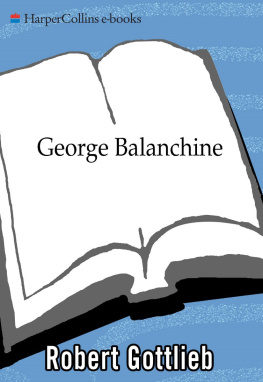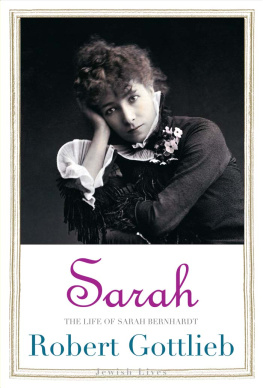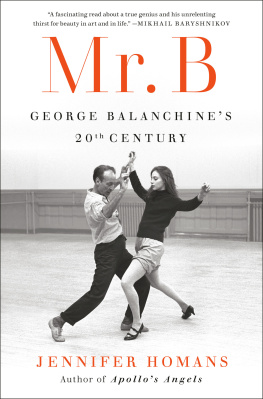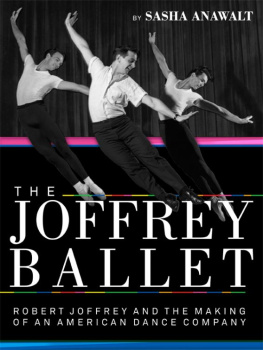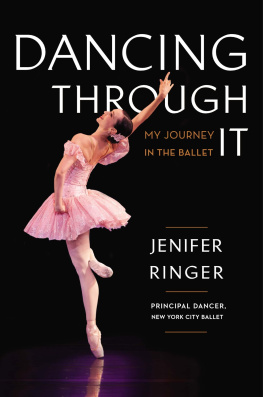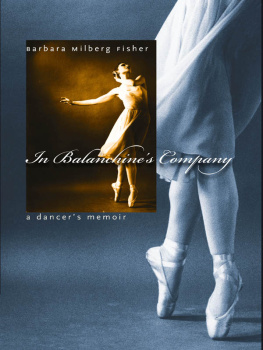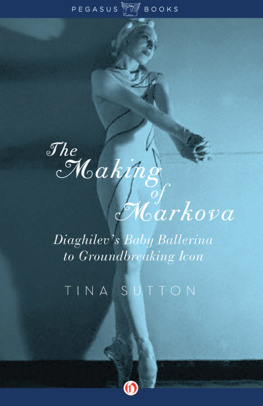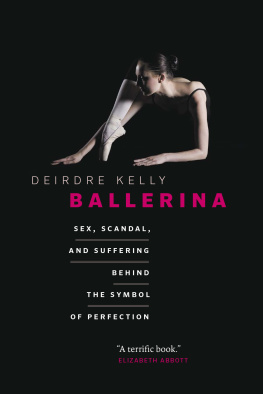G eorge Balanchines centenary year, 2004, seemed to me the appropriate moment to publish a compact biography of him. Unlike so many other artists dominant in their day, he has not receded into history since his death. Rather, in the past twenty-one years his influence has become more pervasive than ever as his ballets spread throughout the world, sometimes dominating, always enhancing the repertories they enter. And now that we can step back and consider his life as a whole with some historical perspective, the trajectory of that life and the richness of his achievement invite new examination and celebration.
I first encountered Balanchines work in 1948, my last year of high school, when one of my teachers, for reasons known only to herself, took a friend and me to a performance of Ballet Society at New Yorks City Center. I didnt know why I was there, but I knew that I loved what I saw. That fall, Ballet Society morphed into New York City Ballet, and since I was by then a freshman at Columbia, and the prices at the City Center were extremely low, I was able to follow the first four years of the company very closely. These were the years of Orpheus, Symphony in C, and Bourre Fantasque ; of The Four Temperaments, Concerto Barocco, and La Valse ; of Maria Tallchief and Tanaquil LeClercq, Jerome Robbins and Nora Kaye and Melissa Hayden, Nicholas Magallanes and Francisco Moncion and Andr Eglevsky. At the time I knew very little about ballet; I only knew how elated I felt every time I watched Balanchine.
As the yearsthe decadeswent by, and as Balanchine kept producing miracles of invention, I began to grasp the scope and depth of his genius. Eventually, as I grew more aware of ballets history, I came to understand his unique place in it. With his roots in the classicism of Petipa and the nineteenth-century Russian tradition, his grasp of the French Opra ballet style, his profound understanding of ballet pedagogy, his absorption of popular dance influences from the waltz to the hornpipe to jazz to Astaire to square dance, his education by Stravinsky and Diaghilev in neoclassicism, his fearless extensions (but never betrayals) of classical technique, his genius for telling a story, his overwhelmingly sensitive response to music, he carried within him all of ballet, past and present, and was constantly redefining its future. Looking backward and looking forward were not separate matters for him; he summed up everything even as he was reinventing everything.
Like comparable geniuses in other art formsShakespeare, Mozarthe composed with amazing fluency and ease; works poured from him without apparent hitch or hesitation. From the very beginning of his career, between the desire and the act fell no shadow. He didnt wait for divine inspirationwhen there was something to be done, he just got to work. Always he adjusted himself to the immediate situation, whatever it was: big stage or little stage; large cast or small; money or no money; ballet, musical comedy, film, or television. And he was always fast, and practical: Situations were there to be exploited, problems were there to be solved. He was a leader, a modelboth a supreme artist and a brilliant executive. To his dancers he was everything. To other choreographers he was a figure of awe. As Twyla Tharp has put it, Balanchine is God.
I came to know him and work with him through Lincoln Kirstein, the man who brought him to America. In the early seventies, I edited several of Kirsteins books, beginning with The New York City Ballet, and Kirstein invited me to join a new board of directors he was assembling for that company. At first I demurred, on the grounds that I wasnt good with rich people and couldnt raise money. He assured me that he needed me there only because I want someone on the board who knows ballet and will understand what to do at the critical momentthe critical moment, I realized, being the one when Balanchine would have to be replaced. In fact, there was no real crisis when that moment came, many years later. But long before then, I had begun performing a number of tasks for the company, whose management level was overstretched. Having learned what I could from the three people in chargeBetty Cage, Eddie Bigelow, and Barbara HorganI was soon programming the ballet seasons and overseeing their marketing from my office, first at Alfred Knopf, then at The New Yorker . I was also involved with labor negotiations and pricing decisions, occasionally acting as company spokesman, and often traveling with the company.
Through those years I spent a considerable amount of time with Balanchine, since there were always issues to discuss. Sometimes I would stand with him in the wings watching performances, sometimes I would go to his office, and in a real crisis I would call him at home. He was always calm, always courteous, always realistic, and always impersonal. I never tried to develop a personal relationship with himthere was no need for one, and I had no wish for one. To me, too, he was a god, and I saw my role as being some kind of messenger of the gods. In fact, I couldnt understand why he was permitting an outsider from another world, whom he hardly knew, to undertake these responsibilities. When, early on, I asked Barbara Horgan, his personal assistant, why he accepted me to the extent that he was even aware of my existence, she explained that my nameGottliebwas the German equivalent of Amadeus, and that the Mozart connection was good enough for him.
My impressions of Balanchine, then, come from close contact but dont reflect the slightest touch of intimacy or even of friendship. Also, of course, I was observing him only in the last dozen years of his life. But it was a great privilege to have known him at all, and an even greater one to have been able to serve him, in however limited a way. The greatest privilege was one I shared with many others: living, from season to season, through the thirty-five years of his engagement with his City Ballet dancers. It wasnt simply a matter of enjoying a number of wonderful performances. For people like me, the New York City Ballet, as Arlene Croce once put it, has been our civilization.
G eorge Balanchine was born in St. Petersburg in 1904, the year after Marius Petipa ( The Sleeping Beauty ) created his last ballet at the Maryinsky Imperial Theatre and the year before Michel Fokine ( Les Sylphides ) created his first. It was the year in which Isadora Duncan made her first appearance in Russia, encouraging Fokine and others in their impulse toward change. And within the next five years the Russian exodus to the West had begun: Pavlova to her eternal touring, Diaghilev with his Ballets Russes to Paris, with Nijinsky and Karsavina in tow. Dancers in St. Petersburg were asserting their views and demanding new rights, which led to a crackdown by management. Russian ballet, on a more or less even keel for decades (apart from the usual internecine conflicts), was in turmoil, and the conservatives chose to consider these disturbing phenomena as hotheaded rebellion rather than as necessary correctives.
The political situation was, of course, equally incendiary. On Balanchines first birthday, January 22, 1905, a group of protesting workers with their families were fired upon in St. Petersburg, and many of them were killed. The slide toward World War I, revolution, and communism had begun.
The immediate world Balanchine was born into, however, was not caught up directly either in politics or in ballet. Georges father, Meliton Balanchivadze, was a successful musiciana composer who specialized in folk song from his native Georgia: The Georgian Glinka. He was a widower in his mid-forties with two grown children when he married Maria Nikolayevna Vassilyeva, a girl less than half his age. (Their son George would also marry much younger women.) Their marriage produced three children: George came between his sister, Tamara, and his brother, Andrei. It seems to have been a happy early childhood, despite financial vicissitudesMeliton was a good-natured, generous, perhaps somewhat profligate man, who dealt with money casually when he had it and wasnt particularly perturbed when he didnt: another quality he shared with his son.

